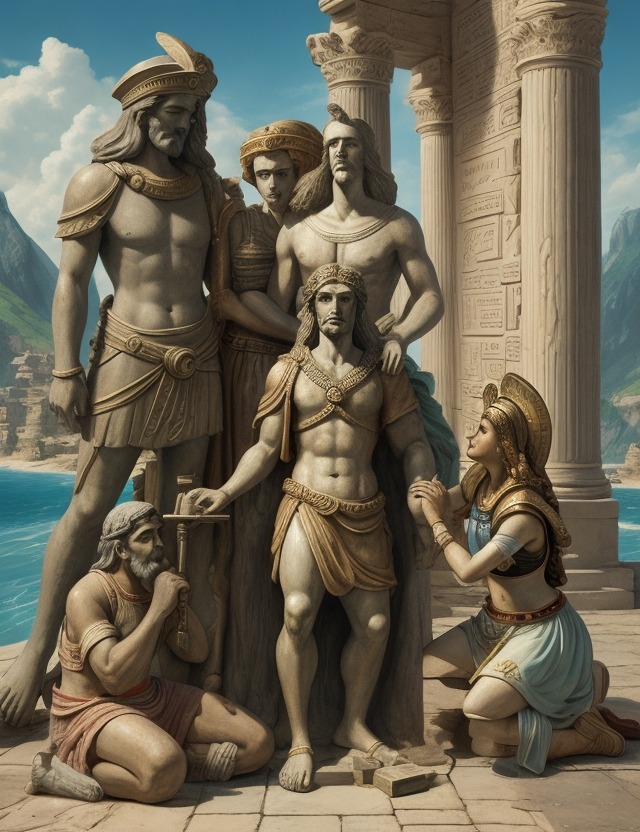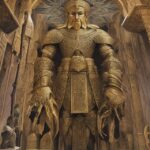Discover the timeless classic epic that has captivated readers for centuries – Homer’s “The Odyssey”. Embark on an extraordinary journey through ancient Greece, as we delve into the trials and tribulations of the heroic Odysseus. From battling mythical creatures to navigating treacherous seas, this exhilarating tale is a remarkable testament to human resilience and the enduring power of hope.
In this article, we will provide an in-depth summary of “The Odyssey”, analyzing its historical significance and uncovering the profound wisdom hidden within its verses. Whether you are a literature enthusiast, a history buff, or simply seeking an enthralling adventure, join us as we unlock the secrets of this literary masterpiece that has stood the test of time. Prepare to be enthralled from the very beginning as we unravel the captivating mysteries of “The Odyssey”.
The Odyssey Summary
A Summary of The Odyssey. Once upon a time, in the land of ancient Greece, there was a remarkable man named Odysseus. He was known for his strength, intelligence, and bravery. However, Odysseus faced many trials and adventures that transformed him into a hero revered throughout the ages. This is the story of his great journey, known as The Odyssey.
Our story begins with a joyous and peaceful time in Ithaca, the homeland of Odysseus. He ruled as the king and was adored by his people. But trouble was creeping up on him as the Trojan War was about to begin. Odysseus, being a valiant warrior, had to join the army and leave his beloved wife, Penelope, and young son, Telemachus, behind.
For ten long years, the city of Troy faced the might of the Greeks. Odysseus proved himself time and time again, with his clever stratagems and bravery. Eventually, the Greeks emerged triumphant, and Odysseus set sail for Ithaca. However, the gods had other plans for him, as they were not yet finished testing his mettle.
As our hero embarked on his voyage home, he unknowingly incurred the wrath of Poseidon, the god of the sea. Poseidon sent furious storms to divert Odysseus from his course. One storm was so powerful it wrecked his ship, causing Odysseus to be stranded on an unknown island.
The first stop in his adventure took Odysseus to the island of the Lotus-Eaters. Here, his men were tempted by the exquisite fruits of the lotus flower, which made them forget their desire to return home. Thankfully, Odysseus managed to save them and continued his journey.
Next, they ventured to Polyphemus’ lair, the Cyclops. Polyphemus was a gigantic one-eyed monster who devoured the crew members of Odysseus one by one. However, our hero had a plan up his sleeve. He offered Polyphemus a drink of wine, making him drunk and sleepy. Odysseus and his men then blinded the monster by plunging a burning stake into his eye. They managed to escape by hiding under the bellies of Polyphemus’ sheep.
As they sailed further, Odysseus and his men reached the island of Aeolus, the god of the winds. Aeolus gifted Odysseus a bag containing all the winds except for the gentle west wind, as a gesture of goodwill. But alas, as his men wondered what treasures lay within, their curiosity got the best of them. They opened the bag, unleashing all the furious winds and heading them off-course once again.
Their next obstacle came in the form of Circe, a powerful sorceress. She turned Odysseus’ men into pigs, intending to keep them forever. But with the help of the god Hermes, Odysseus managed to resist Circe’s spell. He made a deal with her: if she would turn them back to humans and aid them in their quest, they would stay with her for a year. Circe agreed, and they continued their journey with newfound powers.
The next challenge they encountered was the haunting song of the Sirens. These mystical creatures sang such a captivating melody that sailors were lured to their deaths on the rocky shores. Odysseus, determined to hear the song but not be tempted by it, ordered his men to plug their ears with beeswax. He himself, however, wanted to experience the melody, so he ordered his crew to tie him to the mast of the ship. Thus, he managed to hear their song without succumbing to their deadly allure.
Following this adventure, they faced the treacherous whirlpool known as Charybdis and the monstrous sea creature Scylla. In this dangerous passage, they lost several more brave companions to these perils. It seemed as though the journey back home was becoming increasingly difficult and full of loss. But Odysseus’s determination never faded; he knew his ultimate goal was to reach Ithaca and reunite with Penelope.
Finally, after countless hardships and trials, Odysseus and his remaining men arrived on the island of the goddess Calypso. She held Odysseus captive for seven long years, tempting him with immortality and her love. Yet, deep down, he yearned for his wife and son, and the gods intervened once more. They convinced Calypso to release Odysseus and provide him with a raft to continue his journey home.
Oh, the joy that filled his heart as he set sail towards Ithaca! He was so close to seeing his beloved homeland after twenty long years of absence. However, the gods were not yet finished testing his resilience, for Poseidon sent forth a mighty storm to destroy Odysseus’s raft. The sea roared with fury, and the waves threatened to consume him. In his desperate struggle for survival, Odysseus clung to the wreckage and fought against the relentless forces of nature.
Just when it seemed that all hope was lost, the goddess Ino, taking pity on Odysseus, appeared before him. She gave him a magical veil that would keep him safe from the treacherous currents. With newfound strength and protection, Odysseus swam through the tumultuous sea until he reached the shores of the Phaeacians.
The Phaeacians, known for their hospitality, welcomed Odysseus with open arms. Queen Arete and King Alcinous listened eagerly to his tale of adventure and loss. Touched by his hardships, they offered him safe passage back to Ithaca on one of their magical ships.
Odysseus, at last, set foot on his homeland. However, the challenges were far from over. The suitors who had overrun his palace sought the hand of his wife, Penelope, believing Odysseus to be lost forever. In a display of cunning and strength, Odysseus, with the help of his son Telemachus, took on the suitors in a dramatic confrontation that would determine the fate of Ithaca.
As the story of “The Odyssey” reaches its climax, the themes of loyalty, perseverance, and the enduring power of intelligence and wit shine through. Homer’s epic tale leaves an indelible mark on literature, a testament to the timeless nature of human struggle and the triumph of the human spirit. Short plot summary of the odyssey.
Key Theme of The Odyssey by Homer
The Odyssey, written by Homer, is an epic poem that tells the story of Odysseus’ journey back home to Ithaca after the Trojan War. It is an ancient Greek tale that explores various themes and motifs. Three key themes found in the book are:
1. Heroic Journey and the Importance of Perseverance:
One of the central themes of The Odyssey is the heroic journey, which showcases the trials and tribulations that a hero must overcome to achieve his goals. Odysseus faces numerous challenges throughout his journey, including encounters with monsters, temptresses, and gods. He must demonstrate great perseverance and resilience to navigate dangerous situations and make his way back home. The theme of perseverance emphasizes the importance of determination and grit in overcoming obstacles to achieve success.
2. The Power of Myth and Legend:
The Odyssey is filled with mythical creatures, fantastical events, and divine interventions. The gods play a significant role in influencing the fates of mortals, helping or hindering their journeys. Through myths and legends, the story delves into the supernatural realm and explores the power of belief and faith. The theme of the power of myth and legend highlights the role of storytelling in shaping cultures and imparting wisdom from one generation to another.
3. The Complexity of Human Nature:
The Odyssey offers a nuanced portrayal of human nature and the complexity of human relationships. Odysseus encounters various characters who represent different aspects of human behavior, including loyalty and betrayal, hospitality and arrogance, and love and betrayal. The theme of human nature explores the choices individuals make, the consequences of their actions, and the impact of their morality on their journeys. The book delves into the shades of gray in human behavior, reminding readers that humans are capable of both heroic acts and moral failings.
In summary, The Odyssey by Homer explores themes of the heroic journey, the power of myth and legend, and the complexity of human nature. These themes provide insights into the challenges faced by heroes, the influence of myths on societies, and the intricacies of human behavior.
The Odyssey Main Character List Analysis
1. Odysseus: The heroic protagonist of the Odyssey, Odysseus is a clever and cunning Greek soldier. He embarks on a perilous journey back home to Ithaca after the Trojan War. Known for his wit and intelligence, Odysseus encounters various mythical creatures and overcomes numerous challenges while trying to outsmart his enemies. With his iconic long, wavy hair and a chiseled jawline, Odysseus is as charming as he is resourceful. Rumor has it that he once defeated a Cyclops with nothing but his quick thinking and a sharpened olive branch.
2. Penelope: The loyal and patient wife of Odysseus, Penelope is left to fend off suitors while awaiting her husband’s return. She is a stunning beauty with long, flowing hair as black as a raven’s feathers. Penelope’s cleverness knows no bounds, as she devises a plan to keep her suitors at bay by weaving and unraveling her father-in-law’s burial shroud. Her wit is matched only by her unwavering love for Odysseus.
3. Athena: The goddess of wisdom, warfare, and craft, Athena is a major guiding force in Odysseus’s journey. She often appears in the guise of a wise old sage or a beautiful young woman with piercing gray eyes. Athena’s loyalty towards Odysseus is immense, and she aids him with her wisdom and strategic advice. In her spare time, she enjoys weaving masterpieces from the clouds, just to show off her artistic prowess to the other gods.
4. Circe: A stunning enchantress with a wicked sense of humor, Circe is known for turning men into animals with a flick of her wrist. With her cascading red curls and emerald-green eyes, Circe mesmerizes anyone who crosses her path. However, beneath her alluring facade lies a compassionate side, as she helps Odysseus and his crew regain their human forms and offers them advice for their journey ahead. Rumor has it that she has a pet pig named Plato, who is surprisingly well-read.
5. Polyphemus: The terrifying Cyclops and son of Poseidon, Polyphemus is a giant with a single, glaring eye in the middle of his forehead. His towering figure and thick, matted hair give him an intimidating presence. It is said that Polyphemus has a weakness for sheep’s milk cheese, which Odysseus uses to deceive and ultimately blind him. Despite his fearsome appearance, Polyphemus possesses a gentle side and enjoys composing haikus in his free time.
6. Calypso: A seductive nymph with flowing golden hair reminiscent of the sun’s rays, Calypso is known for enchanting mortal men and keeping them captive on her island. Her voice is as melodious as a thousand harps, and her seemingly endless hospitality promises eternal pleasure. Though Calypso plays a minor role in the Odyssey, she showcases her enchanting skills by crafting artistic sandcastles on the shore, each more elaborate than the last.
7. Telemachus: Odysseus’s courageous and loyal son, Telemachus is left to rule Ithaca in his father’s absence. Despite his youth, Telemachus possesses a regal bearing with his thick, curly brown hair and piercing blue eyes. He embarks on his own journey to uncover the truth about his father’s fate and proves himself a capable leader. It is said that Telemachus has a fondness for sculpting miniature ships out of clay during his spare time.
8. Hermes: The swift and mischievous messenger god, Hermes always carries his winged sandals and a mischievous twinkle in his eyes. With his golden curls and a sly smile, Hermes is famed for his ability to travel between the mortal and divine worlds. He assists Odysseus in his journey by offering guidance and protection, and it is whispered among the gods that he once pranked Zeus himself by turning his thunderbolts into feather dusters.
9. Poseidon: The god of the sea, Poseidon is known for his fierce temper and the wrath he unleashes upon those who cross him. With his wild, sea-salt scented mane of dark blue hair and a saltwater beard to match, Poseidon commands immense power. His anger is provoked when Odysseus blinds his son, Polyphemus, and he spends most of the story plotting against the hero. It is said that Poseidon enjoys composing epic ballads about the storms he creates at sea.
10. Zeus: The king of the gods, Zeus exudes a regal aura with his flowing white beard and a crown of lightning bolts. He is often seen sitting upon his throne on Mount Olympus, holding his majestic eagle atop his right shoulder. Zeus serves as the ultimate deity.
The Odyssey Homer: Symbols
1. The Olive Tree: The olive tree is a significant symbol throughout The Odyssey, representing peace, prosperity, and the return to one’s homeland. In the story, Odysseus encounters an ancient olive tree in the land of the Cyclops. This tree serves as a reminder of his desire to return to Ithaca, his home. Additionally, the olive tree represents the peaceful resolution between Odysseus and his son Telemachus, as they reunite under the olive tree’s shade, symbolizing harmony restored within the family.
2. The Bow of Odysseus: The bow of Odysseus, which he skillfully maneuvers during his return to Ithaca, symbolizes his strength, prowess, and leadership. This weapon is a testament to Odysseus’ identity as a warrior and his ability to overcome challenges. Additionally, the bow becomes a symbol of civil order and loyalty when it is used to win Penelope’s hand in marriage, as only Odysseus possesses the strength and skill required to string and shoot the bow.
3. The Lotus Flower: The lotus flower symbolizes temptation and the allure of giving in to one’s desires. In the story, the lotus flower causes Odysseus’ men to lose their desire to return home and instead become consumed by the flower’s intoxicating effects. The lotus symbolizes the danger of indulging in pleasures that distract one from their goals and responsibilities. It serves as a warning to Odysseus and his crew, highlighting the importance of self-discipline and resisting temptation on their journey.
The Odyssey Moral Lessons
The poem is full of moral lessons that can inspire and guide us today. Some of the moral lessons in the Odyssey are:
- Loyalty: Odysseus is loyal to his family, his homeland, and his comrades, and he expects the same from them. He rejects the temptations of the sirens and the nymphs, and he punishes the suitors who try to woo his wife, Penelope. He also rewards his faithful servants, such as Eumaeus and Eurycleia, and his loyal dog, Argos. Loyalty is a virtue that can strengthen our relationships and our sense of belonging.
- Intelligence: Odysseus is known for his cunning and his wit, which help him overcome many obstacles and enemies. He devises clever plans, such as the Trojan horse, the escape from the Cyclops, and the disguise as a beggar. He also uses his knowledge of geography, astronomy, and mythology to navigate his way home. Intelligence is a skill that can help us solve problems and achieve our goals.
- Perseverance: Odysseus faces many hardships and dangers on his journey, such as storms, monsters, and hostile people. He never gives up hope, and he always strives to return to his family and his kingdom. He endures the wrath of Poseidon, the god of the sea, who tries to prevent him from reaching his destination. He also overcomes his own flaws, such as pride, anger, and curiosity, which often get him into trouble. Perseverance is a quality that can help us overcome challenges and difficulties.
- Compassion: Odysseus shows compassion and kindness to those who are in need or who treat him well. He spares the lives of some of his enemies, such as the Phaeacians and the Cyclops’ brother. He also helps his friends, such as the ghosts of the dead warriors, and the swineherd Eumaeus. He respects the gods and the customs of different cultures, and he honors the hospitality of his hosts. Compassion is a value that can help us empathize with others and respect their dignity.
The Odyssey Gods
The poem is full of gods and goddesses who intervene in the human affairs and influence the fate of the heroes. Some of the major gods and goddesses in the Odyssey are:
- Athena: The goddess of wisdom, war, and crafts. She is the patron and protector of Odysseus and his son Telemachus. She often helps them with her divine powers and disguises herself as different characters, such as Mentor, an old friend of Odysseus. She also speaks up for them in the councils of the gods on Mount Olympus.
- Poseidon: The god of the sea, earthquakes, and horses. He is the main antagonist of Odysseus, who angers him by blinding his son, the Cyclops Polyphemus. He constantly hampers Odysseus’s journey home by sending storms, waves, and monsters. He also opposes the Phaeacians, who help Odysseus return to Ithaca.
- Calypso: A beautiful nymph who lives on the island of Ogygia. She falls in love with Odysseus and holds him captive for seven years, hoping to make him her immortal husband. She offers him eternal youth and happiness, but he refuses. She eventually lets him go after Hermes, the messenger god, persuades her to do so.
- Circe: A powerful witch-goddess who lives on the island of Aeaea. She transforms Odysseus’s men into pigs when they land on her island. She also seduces Odysseus and makes him her lover for a year. She gives him advice and guidance on how to reach the underworld and how to avoid the dangers of his journey.
There are many other minor gods and goddesses that appear in the Odyssey, such as Zeus, Hermes, Ino, Helios, and Scylla.
The Odyssey Quotes about Odysseus
Odysseus is the main character of the Odyssey, an epic poem by Homer that tells the story of his long and adventurous journey home after the Trojan War. Odysseus is a hero who is known for his courage, intelligence, and loyalty, but also for his pride, anger, and curiosity. Here are some quotes from the Odyssey that describe or reveal something about Odysseus:
- “Sing to me of the man, Muse, the man of twists and turns / driven time and again off course, once he had plundered / the hallowed heights of Troy.” (Book 1, lines 1-3) This is the opening line of the poem, which introduces Odysseus as the subject of the story and his epithet, “the man of twists and turns”. This epithet suggests that Odysseus is a complex and versatile character, who can adapt to different situations and overcome various obstacles. It also implies that his journey is not straightforward, but full of twists and turns, both literal and figurative.
- “Much have I suffered, labored long and hard by now / in the waves and wars. Add this to the total—bring the trial on!” (Book 5, lines 219-220) Odysseus says these lines when Calypso tells him that he will face more troubles if he leaves her island. Odysseus shows his willingness to endure hardship and his desire to return home, even if it means risking his life. He also shows his confidence and courage, as he challenges fate to bring on the trial.
- “Nobody—that’s my name. Nobody— / so my mother and father call me, all my friends.” (Book 9, lines 366-367) Odysseus tells this lie to the Cyclops Polyphemus, who asks him his name. Odysseus uses his cunning and wit to trick the Cyclops, who later cries out that “Nobody” is hurting him, making the other Cyclopes think that he is fine. Odysseus demonstrates his cleverness and his ability to think on his feet, which help him escape from danger.
- “My fame has reached the skies. Sunny Ithaca is my home. / Atop her stands our seamark, Mount Neriton’s leafy ridges shimmering in the wind.” (Book 9, lines 19-20) Odysseus says these lines when he introduces himself to the Phaeacians, who offer him hospitality and help. Odysseus boasts about his fame and his homeland, showing his pride and his love for Ithaca. He also reveals his identity, which is a risky move, as he does not know if the Phaeacians are his friends or foes.
- “Great Odysseus melted into tears, running down from his eyes to wet his cheeks… / as a woman weeps, her arms flung round her darling husband, / a man who fell in battle, fighting for town and townsmen.” (Book 8, lines 521-523) The poet describes Odysseus’s reaction when he hears the bard Demodocus sing about the Trojan War. Odysseus weeps because he is reminded of the horrors of war and the losses he suffered. He also weeps because he misses his wife, Penelope, who is waiting for him in Ithaca. The poet uses a simile to compare Odysseus’s weeping to that of a woman who mourns her husband, showing that Odysseus is not only a brave warrior, but also a sensitive and emotional human being.
These are some of the quotes that illustrate Odysseus’s character and his role in the Odyssey.
The Odyssey Homer: Culture Impact
The Odyssey by Homer is an epic piece of literature that has had a significant cultural impact throughout history. This timeless tale of adventure and heroism has not only entertained readers for centuries but has also influenced various aspects of society.
Historically, The Odyssey is believed to have been written around the 8th century BCE, and its impact can be seen through the numerous adaptations and references it has garnered over the centuries. In ancient Greece, the story of Odysseus’ long and perilous journey home from the Trojan War became a foundation of Greek education and culture. It was recited and performed at festivals, serving as both entertainment and a source of moral lessons. The story also became part of the oral tradition, passed down from generation to generation, further cementing its cultural significance.
One of the book’s greatest achievements is its ability to resonate with readers from different time periods and cultures. As a complex and multi-layered narrative, The Odyssey delves into themes of heroism, loyalty, and the struggle between fate and free will. Through these universal themes, the book continues to captivate and inspire readers of all ages, demonstrating its enduring cultural impact.
The impact of The Odyssey can also be seen in its influence on subsequent works of literature, drama, and even film. Many renowned writers and playwrights, including James Joyce, William Shakespeare, and T.S. Eliot, have drawn inspiration from Homer’s epic. In fact, James Joyce’s modernist novel Ulysses is a retelling of The Odyssey set in Dublin, showcasing the ongoing influence of Homer’s epic in contemporary literature.
The book’s cultural impact is not limited to literary works alone. The Odyssey has also infiltrated popular culture, becoming a part of everyday language and reference. The term “Odyssey” itself has come to signify a long and challenging journey, while characters such as the cunning Odysseus and the alluring sirens have become iconic figures in our collective imagination.
Interestingly, while The Odyssey deals with serious themes, it is not devoid of humor. Homer’s clever use of wit and satire provides comedic relief to the otherwise intense and dramatic narrative. The encounters with mythical creatures, such as the Cyclops Polyphemus and the enchantress Circe, often result in humorous and entertaining scenes. This balance of serious and comical elements adds to the book’s cultural impact, further solidifying its status as a beloved and influential work of literature.
In summary, The Odyssey by Homer has had a profound cultural impact, evident through its historical significance, enduring popularity, and influence on subsequent works of literature and popular culture. With its themes of heroism, loyalty, and the struggle against adversity, this epic tale continues to captivate readers and shape cultural conversations even after thousands of years.
FAQs
1. Who is the author of “The Odyssey”?
The author of “The Odyssey” is Homer, an ancient Greek poet.
2. When was “The Odyssey” written?
“The Odyssey” was written in ancient Greece, estimated to be composed around the 8th century BCE.
3. What is the main storyline of “The Odyssey”?
“The Odyssey” follows the epic journey of the Greek hero Odysseus as he attempts to return home after the Trojan War, facing numerous obstacles and adventures along the way.
4. What are some notable characters in “The Odyssey”?
Besides Odysseus, other prominent characters in “The Odyssey” include Penelope (Odysseus’ faithful wife), Telemachus (Odysseus’ son), Athena (the goddess who assists Odysseus), Cyclops Polyphemus, Circe (the sorceress), and Calypso (the nymph).
5. Why is “The Odyssey” considered a classic and still popular today?
“The Odyssey” is considered a classic because it is a masterpiece of ancient Greek literature, depicting universal themes of heroism, perseverance, and the human condition. It showcases the power of storytelling and has had a significant influence on Western literature, art, and culture. Its enduring popularity is attributed to its engaging narrative, memorable characters, and the timeless lessons it teaches.










